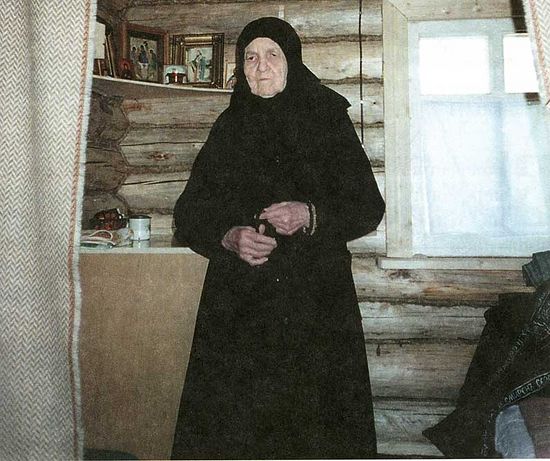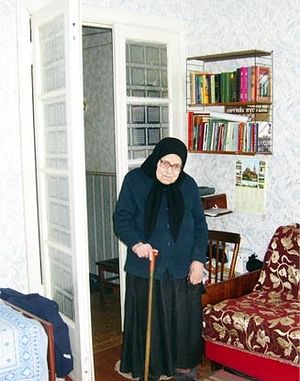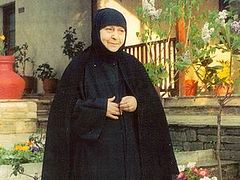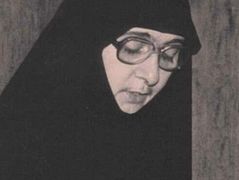I’m in Kireyevsk. Schemanun Sepphora spent many years of her life in this small Tula Region town. The clairvoyant Schemanun Sepphora prayerfully stood at the forefront of the rebirth of Optina Monastery and Klykovo, and died in 1997 in her 102nd year of life. Abbots and archpriests turned to her for help and advice, and thousands felt in their own lives the power of her fiery prayer, which flew to the throne of God like a bird.
By the will of God, I found myself in Kireyevsk, visiting the daughter of Matushka Sephhora, Schemanun Joanna. I had visited her several times, and every time I was amazed by Mother Joanna’s wisdom, modesty, delicateness, and tact. She also looked a lot like her mother. Matushka Joanna is now eighty-seven years old, but she does everything herself, and regularly goes to church. She even receives guests with love, treating them with delicious food.
I entered with bated breath the apartment where Matushka Sepphora had lived for many years. A two-story house, a small two-room apartment on the first floor, rather cold. The floor is like ice. Sepphora’s cell is small: a wardrobe, a table, a chair, and a simple metal bed. Icons on the wall. Near the icons is a tapestry of the Mystical Supper. It had been completely dark and faded, and now it had renewed itself; the colors sparkled like new. Even the tablecloth in the image on the tapestry, previously dark, had become snow-white. A small paper icon of St. Nicholas the Wonderworker had also renewed itself. Mother Joanna allowed me to venerate the eldress’s reliquary cross, and I smelled a sweet fragrance coming from it.
Matushka brought out Matushka Sepphora’s cane and gently patted me with it, as the eldress had done once, and kept saying, “It’s not me patting you; I am no one; it’s Matushka tapping you.” It’s surprisingly easy to breathe in this simple cell with old furniture. You can feel good and joyful, such that you don’t even want to leave.
Mother Joanna told me about her mother, who was a very kind and humble person. She helped her daughter before she was a nun, just a widow, to raise her son and daughter. She loved her grandchildren. She would caress her grandson on the head and repeat, “Vovka—smart head!”1
“Mother Joanna, tell me again, please, about Matushka Sepphora as an eldress!”
“Yes, they consider my mother an ascetic of prayer and a clairvoyant eldress, but I can only talk about what a kind mother and grandmother she was. She hid her gifts as an eldress, such that I didn’t even suspect them. Come on, I’ll pour some more tea!”
She left to get the kettle, and I sadly looked at the large portrait of Mother Sepphora on the wall: “Well, Matushka, I’m at your house. Will I really hear nothing about you, and not find out anything new?” It seemed to me that Mother Sepphora smiled at me a little: “Oh, how impatient you are, Olya!2” Immediately behind her smile, a trill call broke out—the foyer was filled with guests from Tula. Valya,3 a spiritual child of Mother Sepphora, had come, bringing other guests with her. It was obvious that they were old friends of Mother Joanna’s.
I started to leave, to not disturb their meeting, but they stopped me, asked me to stay, and promised, “We want to tell you about Sepphora!” The guests had brought herring salad, baked salmon, some sweets, and even a brand-name cake—“Prague”—from one of the sisters. We had a mountain of food!
At the table, Mother Joanna asked Valya, “Well, tell Olya about Matushka,” and Valya joyfully shared her recollections about the eldress. I listened to her, from time to time casting a glance at the portrait of Mother Sepphora, who was smiling at me, and, it seemed, saying, “Look, you see! And you were upset!” It was as if the eldress was sitting with us at the table, listening to Vaya’s story and stooping to us like little children: “My dear little children! Well, remember me, if it comforts you!” And Valya shared recollections…
Valya’s husband had died early, and she greatly mourned him after death. And then one time she decided to go see the elder Schema-archimandrite Christopher who lived in Tula. She went to see the elder, and he was lying in bed, old and sick. Valya looked—there was as if a cloud of light around the elder’s head. Valya thought, “It must be his gray hair shimmering… No, wait—hair doesn’t shimmer like that…”
But Fr. Christopher said to her, “Go, my daughter, to Optina. Then the Lord will send you to Shamordino. And then, to Matushka, to Matushka, to Matushka!” With these last words, he even raised himself up in bed and stretched his hands upward.
Valya marveled. To what matushka?! What Shamordino?! At that time, she barely even knew anything about Optina… At these words, she imagined an endless yellow desert, but she decided to fulfill the elder’s blessing and left.
In Optina, Valya went up to Igumen A. Batiushka didn’t ask her anything, but gave her a book with some bookmarks. He told her to sit in church on a bench and read, and Valya read every answer to the questions plaguing her, and the words comforted her sorrow. She understood that her whole life was open to Batiushka. She thus became a faithful and devoted spiritual child of Fr. A.
Igumen A. blessed Valya to go to the women’s monastery in Shamordino and stay there until Ascension. In the monastery, she jumped in the holy spring and prayed at the long monastic services, and her grief slowly faded, then disappeared completely. But she became a little bored in Shamordino and wanted to go back to Optina. She decided to leave, not waiting for Ascension day. She was walking down the road when she saw Igumen A’s car. He asked her, “Where are you going? What day did I bless you to stay until, eh?!” Valya turned back.
She reluctantly returned, and the next day they suddenly invited her to eat at the monastic trapeza with the sisters instead of at the pilgrims’ trapeza. Everything there was so beautiful and full of grace! Valya liked it so much there that she was sad to go. She would have lived in Shamordino… Then they approached her and said, “Get ready—they’ve come for you.” Valya remembered that the next day was Ascension! Her spiritual father thus taught her obedience and humility.
She stayed in Optina and Shamordino, as her elder Christopher had blessed. Now only, “To Matushka, to Matushka, to Matushka!” remained. But where to look for this matushka? She had just barely thought of it when she met an acquaintance who told her she was going to visit an eldress—Matushka Sepphora. Valya thus met Matushka, and soon became one of her own in her home.
The spiritual world was open to Matushka. She saw with her spirit the problems and woes of her spiritual child, and knew what was happening with them. Even the smallest everyday details did not remain hidden from her.
Valya was going to see Matushka—she had bought her a bag full of groceries. She looked—there was a head of cabbage on the counter. How nice! Should she take it or not? She thought, and thought… No, the bags were so heavy. She wouldn’t be able to carry them. Her husband Volodya4 made shchi once—it was delicious. Then she thought, “Alright, there’s cabbage there! We’ll have Volodya’s shchi!”
She arrived at Matushka Sepphora’s, and she heard from the doorway, “Well, did you buy that wonderful head of cabbage? No? Don’t be upset. We have so many heads lying there in the kitchen. All right, there’s cabbage there! We could have Volodya’s shchi!”
Another time Valya went to see Matushka and bought her a loaf of bread, still hot, and she thought, “I hope I can manage to get the bread to Mother still fresh and hot!” And Mother Sepphora opened her door and said, smiling, “Well, get your fresh bread out—you delivered it hot!”
Valya sang in church on the kliros. One time they had some problem, a clash. Valya got unjustifiably offended, so much so that she decided to go and tell the rector everything, to complain about her offenders and find protection. She walked and walked, and suddenly, halfway there, someone as if stopped her. She completely lost the desire to complain to the rector. In place of this desire came a strong need to immediately run to Matushka Sepphora. Valya ran full speed to see Matushka.
She was going up the stairs when the eldress, as if waiting for her, opened the door in advance, immediately saying from the doorway, “So, did you decide to complain? Never complain! No matter how much they offend you, don’t complain! Pray that the Lord Himself might direct and protect you! Do you understand?”
Valya stopped for a moment. She was silent. She raised a cup of tea and took a few sips. It was obvious that recollections of the past were arising, and she was experiencing it again.
I raised my eyes to the portrait of Matushka and mentally said to her, “Yes, Matushka, I also sometimes battle with thoughts of resentment. I really wanted to complain about the injustice, and I just gritted my teeth, keeping myself from ‘a march in search of truth,’ and I wrote the words of Blessed Augustine in a notebook: “Better the sorrow of one who suffers unjustly than the joy of one who acts unjustly,” and the words of St. Ignatius Brianchaninov: “If no temptation can touch a man without the will of God, then complaints, murmuring, grief, self-justification, accusing your loved ones, and accusing are the essence of the soul’s movement against the will of God.”
But Valya continued her simple-hearted story.
She sat with Matushka, who, of course, prayed for Valya, and the resentment left. She let go of her despondency. Valya felt good and peaceful in her soul, and Mother Sepphora said to her, “Now go to the service. You’ll make it onto the bus. You’ll be a little late to the service, but it’s no big deal, don’t worry! Go to your place on the kliros, and stand and sing as if nothing happened.”
Valya went to the service. She barely made it onto the bus: She had just jumped on the bottom step when it took off. She was a little late to the service. If not for Matushka’s blessing, she would never have dared to wade through the crowd of worshipers to the kliros. She calmly went to her spot, stood, and sang. No one even noticed that she was late—it was nothing out of the ordinary.
After the service, it was as if there had been no conflict—smooth and quiet, by the grace of God. Since then, they have lived peacefully by Matushka’s prayers.
Valya finished her story, and we read the cell akathist to Schemanun Sepphora in her little room. The last words of the akathist rung out, and I said goodbye to these wonderful people. Mother Joanna invited me to visit her.
So, I visited Matushka Joanna and Sepphora. I threw a parting glance at the eldress’ portrait. Mother Sepphora looked at me with love, that very love which suffereth long, and is kind; which envieth not; which vaunteth not itself, is not puffed up, Doth not behave itself unseemly, seeketh not her own, is not easily provoked, thinketh no evil; Rejoiceth not in iniquity, but rejoiceth in the truth; Beareth all things, believeth all things, hopeth all things, endureth all thing, and which never faileth!






